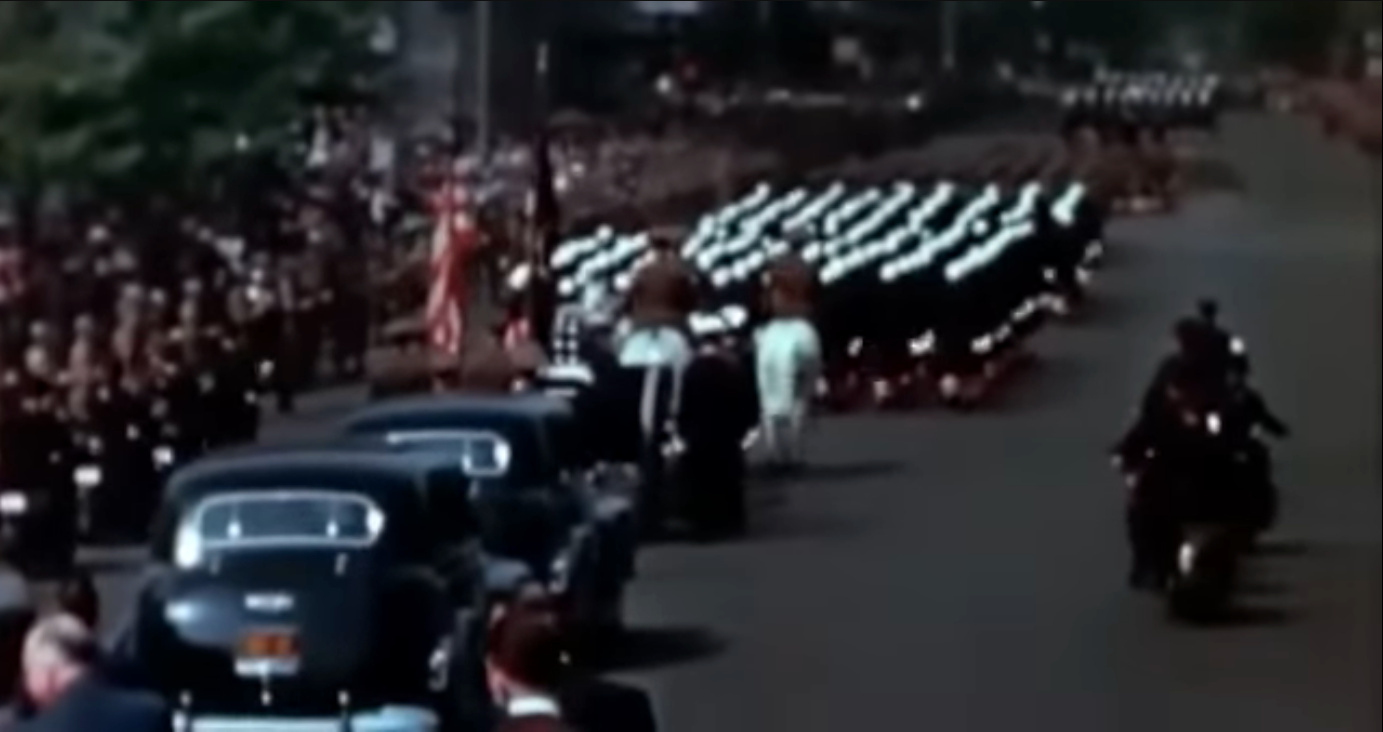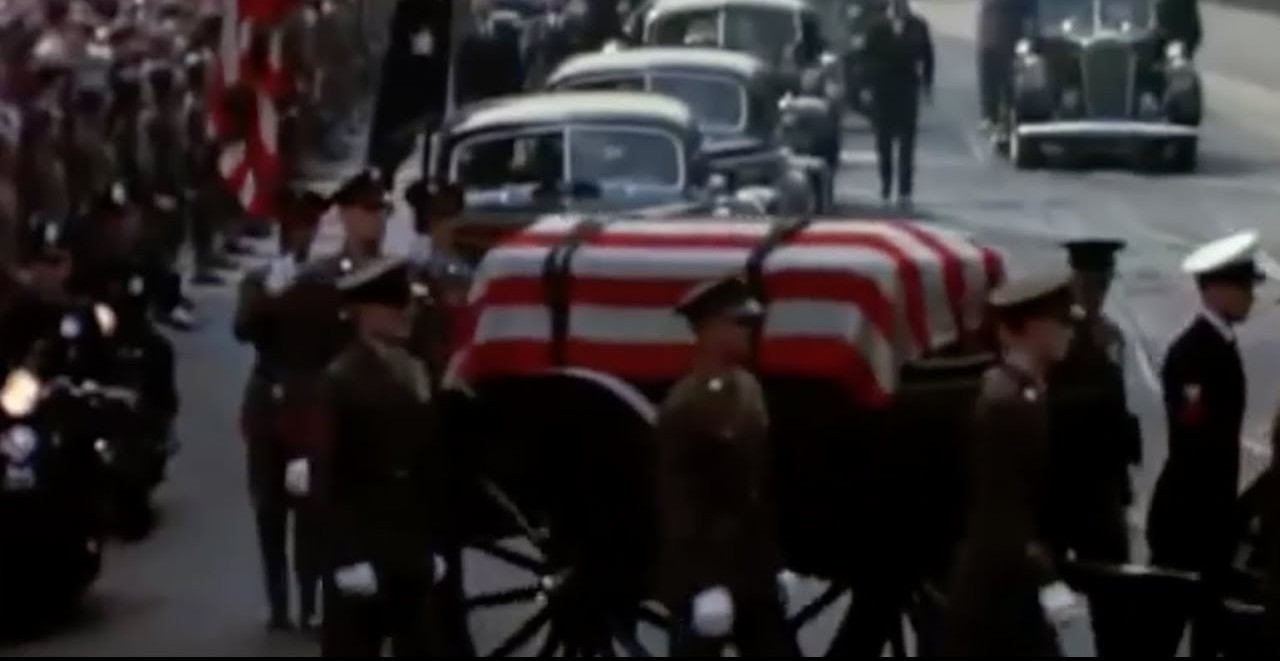The Pittsburgh Press (April 14, 1945)
Truman heads crowd as body is returned; Eden flies to funeral

WASHINGTON (UP) – President Roosevelt’s body was borne through the hushed streets of the nation’s capital today to receive the people’s tribute.
The special train drew into Washington’s Union Station just before 10 a.m. and came to a slow halt where President Truman and the leaders of the government who worked with Mr. Roosevelt in peace and war were waiting. Mr. Roosevelt died Thursday at Warm Springs, Georgia.
In the plaza outside and along the troop-lined avenue leading to the White House, silent crowds stood in silence in the sultry April sunshine.
It was a wartime ceremony in keeping with an America whose forces were fighting toward victory in Europe and in the Pacific.
Simple funeral services were set for 4 p.m. at the White House.
British Foreign Secretary Anthony Eden flew here to represent Prime Minister Winston Churchill.
Battalions of soldiers, sailors and Marines marched slowly ahead of the shrouded caisson that bore Mr. Roosevelt’s body from the station to the White House.
G.I. troops in olive drab with fixed bayonets and their dusty working leggings and G.I. shoes stood every three paces along the cortege route.
Only one son present
Only one of the president’s four sons – Brig. Gen. Elliott Roosevelt – reached Washington for the ceremony. The others were with the Navy and the Marines at their war posts in the Pacific.
Elliott, the four Roosevelt daughters-in-law and Mrs. John Boettiger were the first to board the funeral train where Mrs. Roosevelt waited. They were followed by Mr. Truman, Secretary of Commerce Henry A. Wallace, and former War Mobilization Director James F. Byrnes.
A moment later, enlisted soldiers and sailors gently lifted the flag-draped casket from the train and passed it to the body-bearers – noncommissioned men representing each of the four service arms.
Marine Band plays
As the casket was placed on the black-draped military caisson, the U.S. Marine Band played “The Star-Spangled Banner,” followed by “The Old Rugged Cross” and “Rock of Ages.”
Battalions of the armed services led the procession through the crowd-packed streets with the Marine Band leading and marching at funereal pace.
The crowds were so quiet that the clumping tread of the marching men down Constitution Avenue sounded like distant surf.
Mrs. Roosevelt composed
Mrs. Roosevelt, outwardly composed as she has been since the tragedy struck, was clad entirely in black. She wore a heavy dotted black veil and rode with her son Elliott and her daughter Anna immediately behind the horse-drawn caisson.
In the next car were the president’s daughters-in-law, and in the third, Mr. Truman, Mr. Wallace and War Mobilization Director Fred M. Vinson.
As the cortege made its slow progress through the streets, squadrons of Flying Fortresses and Liberator bombers – symbols of American aerial might – roared overhead.
Crowds stand five deep
The crowds which stood five deep along Constitution Avenue where the procession passed down the broad avenue of government buildings – most of them erected in the early days of Mr. Roosevelt’s administration – watched quietly.
Here and there in the crowd a woman fainted in the unseasonable sticky heat. Some stood on chairs or boxes to get a better view and many shielded their faces from the hot sun with newspapers.
The procession was about a mile long and it required 35 minutes to pass a given point.
Guard of honor there
At 11:14 a.m., the caisson entered the White House grounds where a combined Guard of Honor – Army, Marine Corps and Navy – was drawn up before the white columns of the center White House portico. Between the guard and the White House was the Navy Band and over the Executive Mansion flew the flag at half-staff.
As the casket was borne into the White House, the Marine Band softly played “Lead, Kindly Light.” Walking behind the casket was Mrs. Roosevelt and, at her side, Vice Adm. Wilson Brown, Mr. Roosevelt’s aide.
Behind them were Elliott. Col. and Mrs. John Boettiger, and, walking together, the four daughters-in-law. Mr. Truman quietly separated himself from the party, leaving the White House to Mr. Roosevelt’s family.
Turning to the executive offices he walked in, hat in hand, and sat down at his desk for his first caller of the day, the New Orleans shipbuilder Andrew J. Higgins.
Burial tomorrow
The cortege leaves tonight for Hyde Park and the burial tomorrow.
The train rolled northward at a deliberate, funereal pace – north from the rolling countryside and red clay roads of the president’s “other home,” in Warm Springs.
At every town and city, mute crowds lined the trackside to watch the cortege pass. Some women cried and men bared their heads.
Each time the train paused – at Atlanta; at Greenville, South Carolina; Spartanburg, South Carolina; Charlotte, North Carolina; Salisbury, North Carolina; Danville, Virginia – masses of flowers were put aboard the car where the casket rested.
Flag drapes casket
The casket, draped by an American flag, was placed on a small platform toward the rear of what had been the lounge car of the Presidential Special. Overhead lights illuminated the car brilliantly and through the three wide windows the crowds could see the casket, the increasing mound of flowers and four guards posted at each corner.
Every two hours, the guards – each representing a branch of the armed forces – were changed.
Aboard the train there was quiet – and grief. The impact of their loss was beginning to be felt upon the president’s staff. Mrs. Roosevelt bore the strain. Stephen T. Early said, “with great courage and heroism.”
In keeping with a nation critically engaged in war, the funeral arrangements were simple.
Horses draw caisson
The caisson, drawn by six grey horses with a seventh to lead, awaited the presidential casket. Eight pallbearers were selected – two non-commissioned officers from each branch of the armed forces, the Army. the Navy, the Marines and the Coast Guard.
The Army Air Forces Band was summoned to play funeral airs while the casket was being placed upon the caisson.
The route of the funeral procession was not the familiar, well-traveled route of Pennsylvania Avenue, and the presidential inaugurations. Instead, the cortege was routed by way of Delaware Avenue down Constitution Avenue – the broad plaza lined with great government office buildings, largely erected in the early days of the president’s New Deal.
Police lead procession
From Constitution Avenue, the route swung over to 15th Street, past the Commerce and Treasury Buildings to Pennsylvania and into the northwest gate of the White House.
A detail of Washington police was assigned to lead the procession, followed by the escort commander and the commander of the military district of Washington.
Next came the U.S. Marine Band, a squadron of scout cars, a battalion of Field Artillery. a battalion of Army Air Forces and Army Service Forces personnel, a battalion of Marines, a battalion of bluejackets and a battalion of women members of the armed forces.
Elliott arrives
The clergy preceded the caisson, followed immediately by Mrs. Roosevelt, members of the Roosevelt family, including the four wives of the Roosevelt sons and Gen. Roosevelt who arrived in Washington early today by plane from Britain.
Attendance at the simple Episcopal services was limited to the Cabinet, the Diplomatic Corps, representatives of the Army, the Navy, the judiciary, Congress, the president’s personal staff and family friends.
The ceremonies were in charge of the Rt. Rev. Angus Dun, Episcopal bishop of Washington, assisted by Rev. Howard S. Wilkinson, pastor of St. Thomas Episcopal Church. It was there on the morning of his inaugural March 4, 1933, that the president prayed as have all presidents since the time of James Madison.
Wesley Steele, organist and choirmaster of St. Johns, will play the president’s favorite hymns, probably “Eternal Father, Strong to Save” – the Navy hymn dear to Mr. Roosevelt’s heart – “O God Our Help in Ages Past” and “America.”
Other services planned
At the Washington Cathedral and at other churches in Washington, memorial services were arranged at 4 p.m. for those unable to attend the White House ceremony. And at that hour throughout America the nation will pause in respect to Mr. Roosevelt.
The armed forces around the world wherever they are not actively engaged in combat will observe five minutes of silent prayer at 4 p.m. and at that moment in thousands of factories, offices and homes all work will cease for a moment of tribute to the late president.



